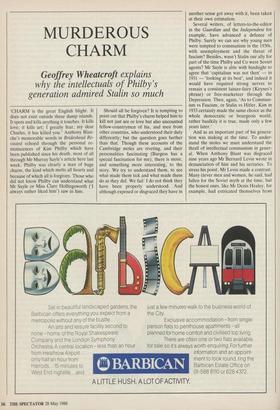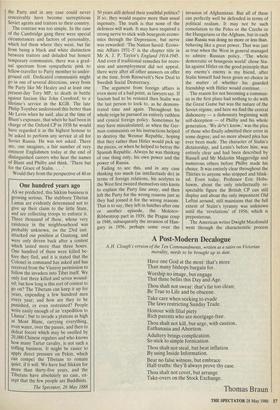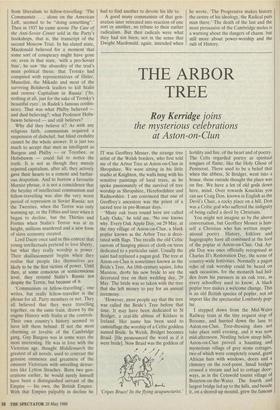MURDEROUS CHARM
Geoffrey Wheatcroft explains
why the intellectuals of Philby's generation admired Stalin so much
'CHARM is the great English blight. It does not exist outside these damp islands. It spots and kills anything it touches. It kills love; it kills art; I greatly fear, my dear Charles, it has killed you.' Anthony Blan- che's memorable words in Brideshead Re- visited echoed through the personal re- miniscences of Kim Philby which have been published since his death, most of all through Mr Murray Sayle's article here last week. Philby was clearly a man of huge charm, the kind which melts all hearts and because of which all is forgiven. Those who did not know Philby can understand what Mr Sayle or Miss Clare Hollingsworth CI always rather liked him') saw in him.
Should all be forgiven? It is tempting to point out that Philby's charm helped him to kill not just are or love but also uncounted fellow-countrymen of his, and men from other countries, who understood their duty differently; but the question goes further than that. Though these accounts of the Cambridge moles are riveting, and their personalities fascinating (Burgess has a special fascination for me), there is more, and something more interesting, to the story. We try to understand them, to see what made them tick and what made them do as they did. We fail: I do not think they have been properly understood. And although exposed or disgraced they have in another sense got away with it, been taken at their own estimation.
Several writers, of letters-to-the-editor in the Guardian and the Independent for example, have advanced a defence of Philby. Surely we can see why young men were tempted to communism in the 1930s, with unemployment and the threat of fascism? Besides, wasn't Stalin our ally for part of the time Philby and Co were Soviet agents? Mr Sayle is able with hindsight to agree that 'capitalism was not then' — in 1931 — 'looking at its best', and indeed it would have required strong nerves to remain a consistent laisser-fairy (Keynes's phrase) or free-marketeer through the Depression. Then, again, As to Commun- ism vs Fascism, or Stalin vs Hitler, Kim in 1933 certainly made the same choice as the whole democratic or bourgeois world, rather baulkily it is true, made only a few years later.'
And as an important part of his genera- tion was making at the time. To under- stand the moles we must understand the thrall of intellectual communism in gener- al. When Anthony Blunt was disgraced nine years ago Mr Bernard Levin wrote in denunciation of him and his sectaries. To stress his point, Mr Levin made a contrast. Many clever men and women, he said, had fallen for the Soviet myth at the time, but the honest ones, like Mr Denis Healey, for example, had extricated themselves from the Party and in any case could never conceivably have become surreptitious Soviet agents and traitors to their country.
The contrast was too simple. In the case of the Cambridge gang there were special circumstances and factors of personality, which led them where they went, but far from being a black and white distinction between traitors and deluded but honest temporary communists, there was a grad- ual spectrum from sympathetic pink to fellow-traveller to Party member to under- ground cell. Dedicated communists might go in one of several directions, away from the Party like Mr Healey and at least one present-day Tory MP, to death in battle against fascism like John Cornford, to a lifetime's service in the KGB. The late Philip Toynbee understood this better than Mr Levin when he said, also at the time of Blunt's exposure, that when he had been in charge of the Oxford CP in 1938 he would have regarded it as the highest honour to be asked to perform any service at all for Soviet Russia. He was not asked. There are, one imagines, a fair number of very eminent Englishmen today at the end of distinguished careers who hear the names of Blunt and Philby and think, 'There but for the Grace of Stalin. . .
Would they from the perspective of 40 or
50 years still defend their youthful politics? If so, they would require more than usual ingenuity. The truth is that none of the defences will wash. It may have required a strong nerve to stick with bourgeois econo- mics through the Depression, but nerve was rewarded: 'The Nation Saved: Econo- mic Affairs 1931-5' is the chapter title in Mr A. J. P. Taylor's England 1914-1945. And even if traditional remedies for reces- sion and unemployment did not appeal, there were after all other answers on offer at the time, from Roosevelt's New Deal to Swedish Social Democracy.
The argument from foreign affairs is even more of a bad point, as lawyers say. If fascism had to be resisted then Stalin was the last person to look to, as he demons- trated time and again. Throughout his whole reign he pursued an entirely ruthless and cynical foreign policy. Sometimes he may have miscalculated, as when the Ger- man communists on his instructions helped to destroy the Weimar Republic, hoping that they rather than Hitler would pick up the pieces, or when he helped to betray the Spanish Republic. Always he was thinking of one thing only, his own power and the power of Russia.
Failing to see this, and in any case thinking too much (as intellectuals do) in terms of foreign relations, his acolytes in the West first twisted themselves into knots to explain the Party line away, and then left the Party for the wrong reasons just as they had joined it for the wrong reasons. That is to say, they left in batches after one or another episode, the Molotov- Ribbentrop pact in 1939, the Prague coup in 1948, subsequently the invasion of Hun- gary in 1956, perhaps some over the invasion of Afghanistan. But all of these can perfectly well be defended in terms of political realism. It may not be such consolation to the Poles or the Czechs or the Hungarians or the Afghans, but in each case Russia was doing no more or less than. behaving like a great power. That was just as true when the West in general managed to admire Russian policy. 'The whole democratic or bourgeois world' chose Sta- lin against Hitler on the good principle that my enemy's enemy is my friend, after Stalin himself had been given no choice in the matter of whether his guarded friendship with Hitler would continue.
The reason for not becoming a commun- ist in the first place had nothing to do with the Great Game but was the nature of the Soviet regime, and here we find the central dishonesty — a dishonesty beginning with self-deception — of Philby and his whole generation. 'We di,in't know,' was the plea of those who finally admitted their error in some degree; and no more absurd plea has ever been made. The character of Stalin's dictatorship, and Lenin's before him, was entirely clear and had been described by Russell and Mr Malcolm Muggeridge and numerous others before Philby made his choice. It was entirely clear throughout the Thirties to anyone who stopped and blink- ed. Even today, Professor Eric Hobs- bawm, about the only intellectually re- spectable figure the British CP can still display and about the only impenitent Old Leftist around, still maintains that the full extent of Stalin's tyranny was unknown until the 'revelations' of 1956; which is preposterous.
The American writer Dwight Macdonald went through the characteristic process
from liberalism to fellow-travelling: 'The Communists . . . alone on the American Left, seemed to be "doing something".' Then in 1937 he came across The Case of the Anti-Soviet Center sold in the Party's bookshops, that is, the transcript of the second Moscow Trial. In his elated state, Macdonald believed for a moment that some sort of conspiracy might have gone on; even in that state, `with a pro-Soviet bias', he saw 'the absurdity of the trial's main political thesis: that Trotsky had conspired with representatives of Hitler, Mussolini, the Mikado and most of the surviving Bolshevik leaders to kill Stalin and restore Capitalism in Russia' ('foi nothing at all, just for the sake of Trotsky's beautiful eyes', in Radek's famous confes- sion). That was what Philby believed and died believing?; what Professor Hobs- bawm believed — and still believes?
Why did they believe it? As with any religious faith, communism required a suspension of disbelief, but blind credulity cannot be the whole answer. It is just too much to accept that men as intelligent as Burgess and Philby — or Toynbee, or Hobsbawm — could fail to notice the truth. It is not as though they merely rejected capitalism, after all; they actively gave their hearts to a remote and barbar- ous despotism. And to borrow a favourite Marxist phrase, it is not a coincidence that the heyday of intellectual communism and fellow-travelling was also the very worst period of repression in Soviet Russia: not the Twenties, when the Terror was only warming up, or the Fifties and later when it began to decline, but the Thirties and Forties when Stalin's Terror was at its height, millions murdered and a new form of slave economy created.
Lord Dacre once said in this context that young intellectuals pretend to love liberty, but what they really worship is power. Their disillusionment begins when they realise that people like themselves are likely to be the first victims of power. Until then, at some conscious or semiconscious level, they revered Stalin's Russia not despite the Terror, but because of it.
`Communism or fellow-travelling', one writes, but really fellow-traveller is the phrase for all, Party members or not. They all believed that they were travelling together, on the same train, drawn by the engine History with Stalin at the controls. Their own country's history seemed to have left them behind. If not the most charming or lovable of the Cambridge gang, Guy Burgess was in some ways the most interesting. He was in love with the Victorian age, thought Middlemarch the greatest of all novels, used to contrast the genuine eminence and greatness of the eminent Victorians with snivelling detrac- tors like Lytton Strachey. Born two gen- erations earlier, he would surely himself have been a distinguished servant of the Empire — his own, the British Empire. With that Empire palpably in decline he
had to find another to devote his life to.
A good many communists of that gen- eration later retreated into reaction of one sort or another, no tribute to their earlier radicalism. But then radicals were what they had not been; not in the sense that Dwight Macdonald, again, intended when he wrote, 'The Progressive makes history the centre of his ideology, the Radical puts man there.' The death of the last and the most persuasive of the Cambridge moles is a warning about the dangers of charm, but still more about power-worship and the cult of History.




















































 Previous page
Previous page